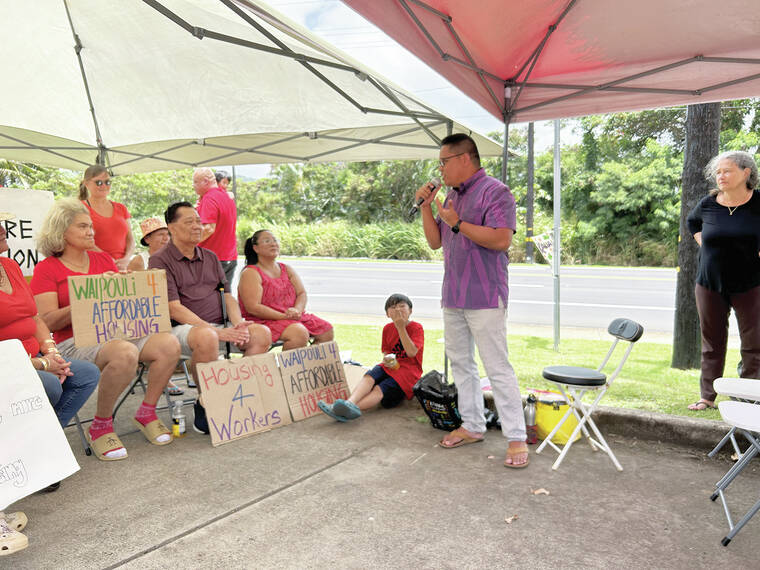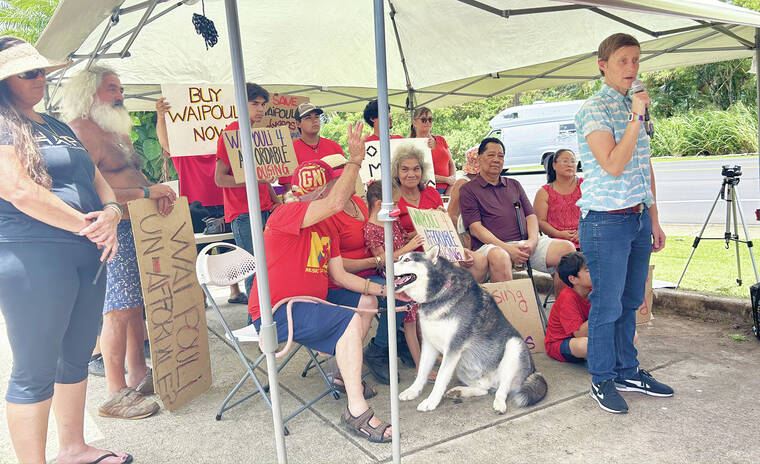WAIPOULI — Affordable housing advocates held a second press conference in the Kintaro restaurant parking lot last week, urging the state government to purchase the Courtyards at Waipouli apartments and secure all 82 units as affordable housing for 60 years.
“The update is we are still hoping and doing everything we can to raise awareness that this building can indeed go back to its original intended purpose of affordable housing,” said Kenna StormoGipson, director of housing policy for the Hawai‘i Budget and Policy Center, who also organized the group’s first press conference late last month.
The property is currently on the market by the original owners for $43 million, said StormoGipson during the event.
“When you do the math on 82 units, that’s about $525,000 a unit. Infrastructure is already here. It’s already built,” she said. “It is a solid investment by the state of Hawai‘i to get affordable housing here as quickly as possible.”
The two-story complex was built in 2009 under the Kaua‘i Lagoons Affordable Housing Agreement, where the owner, KD Waipouli LLC, was required to charge affordable rents for 41 — or 50 percent — of the units for the first 10 years after its construction. When the affordability restriction expired in August 2019, the county declined to purchase the property through a first-right-to-purchase clause. The state also decided not to invest.
Rental rates have since increased from $1,800 in 2019 to $2,900 in 2023. The state purchase would drop rates down to $1,600 for a two-bedroom unit, according to StormoGipson.
An application has been submitted to the state Hawai‘i Housing Finance and Development Corporation asking the state to purchase the property through the use of federal and low-income tax credits and commit to making all 82 units affordable for 60 years.
County council Members Felicia Cowden and Addison Bulosan spoke during the gathering of approximately 20 people, in addition to multiple housing advocates and impacted residents.
Cowden empathized with the people struggling, saying the county is considering the purchase but has a finite amount of money.
“We have all this development that is underway,” said Cowden, noting five different affordable housing projects are being constructed on Kaua‘i over the next several years.
But Bulosan stated more needs to be done now to address affordable housing issues in the county.
“This stuff in the future is like years from now. And it’s hard to share with you positive stuff when right now you’re here getting evicted,” he said.
“We’re failing as a government to provide homes for our community. All across the board. It’s everybody, and the solution is now.”
Council Chair Mel Rapozo, who attended via Zoom, also advocated for the state purchase.
“We gotta encourage our state senator and our representatives and all the legislators across the state,” he said. The alternative is these units are sold for a timeshare. That’s what’s gonna happen. (The purchase) has to happen or it’s gonna be devastating for our island,” he said.
According to StormoGipson, the Hawai‘i Housing Finance and Development Corporation will announce its decision on whether to invest in the property in July or August.
•••
Emma Grunwald, reporter, can be reached 808-652-0638 or egrunwald@thegardenisland.com.




The betterment of the houseing situation on Kauai needs to be speeded up. Government resources for it are there from the state and federal banks. About 500=1000 homeless and those on the fringes of homelessness got to be bolstered. Please help, please.
This should be a no brainer! We desperately need housing in Kapaa. It’s ideal location and on a bus route and it’s immediate relief.
I do not understand why you suggest limiting this project for 60 years, creating a new affordable housing crisis in 60 years. New York City has permanent RENT CONTROL. Why the limit? Just kicking the problem down the road for 60 years??? No, no and no.
Kauai’s unemployment rate is back to historic lows. There are plenty of jobs going unfilled at $20/hr. Do people who don’t want to work hard deserve to have subsidized housing paid for by taxes collected from people who work hard ? How many people who live in subsidized “workforce” housing actually work full-time ?